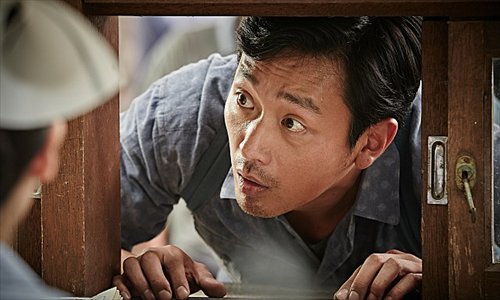HOME >> ARTS
‘Blood Merchant’
By Liao Danlin Source:Global Times Published: 2015-3-5 20:58:01
S. Korean adaptation of Chinese novel anemic

A scene from Chronicle of a Blood Merchant starring Ha Jung-woo Photo: CFP
The South Korean adaptation of Chinese writer Yu Hua's novel Chronicle of a Blood Merchant hit cinemas earlier this year. The film earned over $4 million at the South Korean box-office during its first week of release, an average performance for the market.Although it is always a challenge to adapt a literary classic onto the big screen, filmmakers have never given up trying. While the South Korean film has not been the masterpiece many people have expected, it does do some things right and will be a good reference for any Chinese or other language versions that may be made in the future.
As for audiences, those who have read the book might gain a better understanding of the story or possibly find a new way of looking at the story through the eyes of the filmmakers.
Funny yet profound
In the book, the main character, Xu Sanguan, is an optimistic gentleman living in China during the 1950s who constantly turns to the same method over and over again to overcome the financial difficulties he encounters in his life: selling off his blood. Throughout his life he sells blood for his wife, his lover and his children. However, when he finally wants to sell his blood so he can afford some food for himself, he is told that he's gotten too old to donate. As the book comes to a close Xu cries over the loss of his all-time lifesaver.
Covering the major historical events that took place in China from the early 1950s to the 1980s, the book is famous for its vivid portrait of the character Xu Sanguan and the country's changing social background.
South Korean star Ha Jung-woo, who has played the leading role in The Terror Live (2013) and The Murderer (2010), takes on the role of both director and lead actor in the film. Starring popular actress Ha Ji-won as the main character's wife, the film is set during the same period as the book but the location has been moved to South Korea.
The South Korean film also narrows its focus on the family relationships in the story, devoting less time to dealing with historical events. The script selects the parts where the family's biggest conflicts surround rumors that their eldest son is not actually Xu's child and the relationship between father and son.
The original novel, published in 1995, was Yu's second book after To Live. Well-known Chinese director Zhang Yimo adapted To Live in 1994, and it is considered as one of Zhang's most artistic and best-accomplished works. The film won the Grand Jury Prize at Cannes that year.
For this reason many moviegoers had high expectations for Chronicle as the two books share many similarities. To Live depicts how Chinese survived revolutions, wars as well as poverty as the main character's family members die one after another over the years. From all the death he has faced, the protagonist comes to understand the meaning of life.
In contrast, Chronicle of a Blood Merchant contains more comedic element and Xu never ends up feeling life is too tough to go on and so continually fights against the difficulties that life has presented him.
CliffsNotes version
The South Korean adaptation didn't come as a surprise since the Korean edition of the novel Chronicle of a Blood Merchant was well-received in South Korea and even selected as one of the 100 must-read books by South Korea's Joongang Daily. As early as 2003, the story had been adapted into a South Korean theater play.
Although selling blood sounds like the act of a desperate man, the tone of the book was nowhere near as heavy as To Live. It actually fits perfectly with the most popular type of story in South Korea, which is a combination of comedy and tragedy.
Stories about family and fathers are also very popular in China and South Korea due to cultural similarities.
For these reasons, the film had the potential to offer an alternative vision of Yu's work. Yet, Ha's film is emotionally flat. While audiences can learn something about the key plot points in the novel, without the laughter or tears that should come with such a story they end up learning nothing about its soul.
Life experience
Works from many of China's most popular writers such as Mo Yan, Yu Hua, Su Tong and Chen Zhongshi have been translated into many languages and adapted to films that have been seen at international film festivals around the world.
Classics like these have been able to catch the attention of and create emotional echoes among audiences because they draw broad pictures that depict the more universal aspects of human nature.
At the same time, they record the transformation of China over the past century. Through extraordinary plots and sometimes-absurd details, they pass the boundaries of many foreign audiences' imaginations.
Thus, unlike many other popular literature works that can be easily adapted into films or television series in different languages, books by these authors are probably more difficult for filmmakers to adapt if they do not have a solid understanding of Chinese history and culture. This isn't limited to foreign filmmakers, but also younger Chinese filmmakers that never experienced the time period and hardships featured in these authors' books.
Therefore, when we hear that a Chinese film adaptation of Chronicle of a Blood Merchant is currently underway and will be directed by Yu Hua's son Yu Haiguo and involving the same cinematography crew that worked on the Japanese movie Departures, we can only hope that this new version will be at least as average a work as the South Korean version.
Posted in: Film